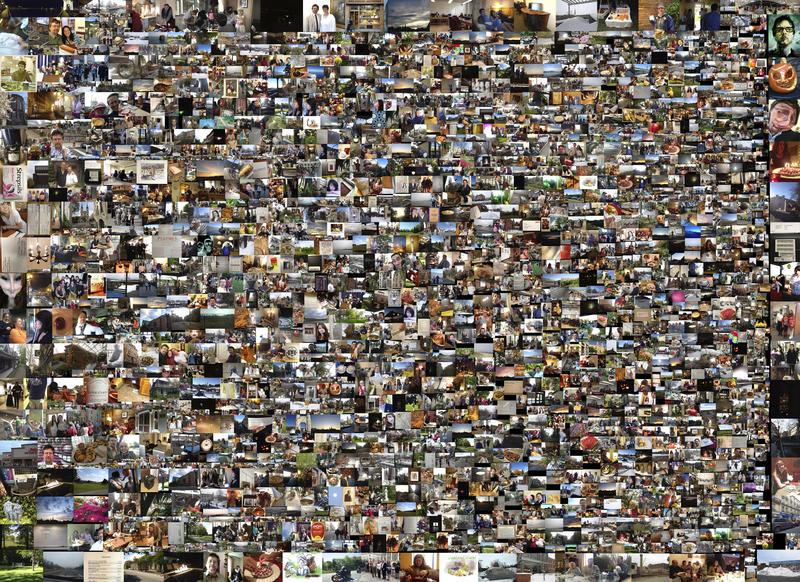Difference between revisions of "CSC352 Final Project 2013"
(→CSC352 FINAL PROJECT) |
(→CSC352 FINAL PROJECT) |
||
| Line 4: | Line 4: | ||
{| | {| | ||
| − | | | + | |style="width: 40%; background-color: white;"| |
<br /> | <br /> | ||
| − | + | ||
__TOC__ | __TOC__ | ||
<br /> | <br /> | ||
| − | | | + | |style="width: 70%; background-color: white;"| |
[[File:Packing2KPhotos.png|300px]] | [[File:Packing2KPhotos.png|300px]] | ||
|} | |} | ||
Revision as of 10:09, 17 October 2013
--D. Thiebaut (talk) 11:00, 17 October 2013 (EDT)
CSC352 FINAL PROJECT
|
Contents
|
The final project is in several parts. You have to pick a particular aspect of the Wikipedia Image Collage problem that requires parallel computation, do some programming to solve some aspect of the problem, and write it up as a research paper using Latex. The due date for the project is the last day of exams. There are several events you need to address to fulfill the requirements, including a final presentation of the project on the last day of class, and a self-scheduled 5-10 minute presentation of the project you picked.
This page may and will be updated during the remainder of the semester. Be sure to keep an eye on it. I will use Piazza to indicate when major updates are added to it.
Due Date
On or before the last day of exam, please submit electronic versions of all the programs you write for your project, along with a text file with a list of all the files submitted in one column, with their description in another column. Also submit electronically the three or more latex and image files containing the paper, the figure(s) and the bibliography.
Timing
The timing is totally left up to you, except for two landmarks:
- A 5-to-10 minute class presentation of the project you picked. You can decide on giving the presentation roughly 12 hours before class by sending me an email of your intent to present.
- A 20-minute presentation of the whole project on the last day of class.
Picking a Problem
The project page in the class wiki lists several possible project ideas. Pick one or suggest one that is of interest to you. Make an appointment with me to go over your selection and clearly define the programming task you will set for yourself.
Several people can pick the same problem. The whole class can pick the same problem. You can work in pairs on the programming, but no more than two people per pair.
Given that we will work with Hadoop last, you should favor picking something requiring a java multithreaded application or an MPI application written in C.
Discussion
Once you have an idea (or several ideas), make an appointment (30 min) with me to go over the problem you picked, and to get the green light.
Content
One of the tasks you need to address in your project is to define some parameter that affects the performance of your program, and measure quantitatively how this parameter affects the performance, and generate one or several graphs that will help others figure out how to make good use of your research.
Latex Research Paper
You need to write up your research effort in a Latex paper. I have several tutorials in my Tutorial page showing how to put together a research paper in Latex. There are also lots of resources available on the Web. If you are not sure where to look, target the ACM or IEEE society for Latex format they recommend for their conferences.
You can pick the format you want: 1 column, 2 columns, single or double spaced.
Your paper should try to follow this general outline:
- Abstract
- An introduction describing the context.
- There should be a subsection covering the Wikipedia image collage idea. Use our visit to the museum to give some background. Use some of the projects listed in the project page in the class wiki as references.
- There should be a subsection in the introduction giving some background relative to the problem you picked: Who has already done some work in this area? What were their approach? Is yours different? If yes, in what way? If not, is there anything different in the way you implement it? What parameter did you pick as a target of your tuning?
- A section describing your problem and your approach to it
- A section describing your setup for the tuning of the parameter
- A section presenting the results of your tuning/experiment. One or several graphs are required (use whatever package you are familiar with to generate the graph, and then generate png or eps versions of the graph).
- A conclusion section summarizing everything and presenting "open-door" areas of research: areas or problems you discovered during your work that could be interesting for others to explore. If your result is that your approach was not as good or not as performant as some other published approach, it is still worth mentioning and indicating to others what alternative should be taken in similar situations.
